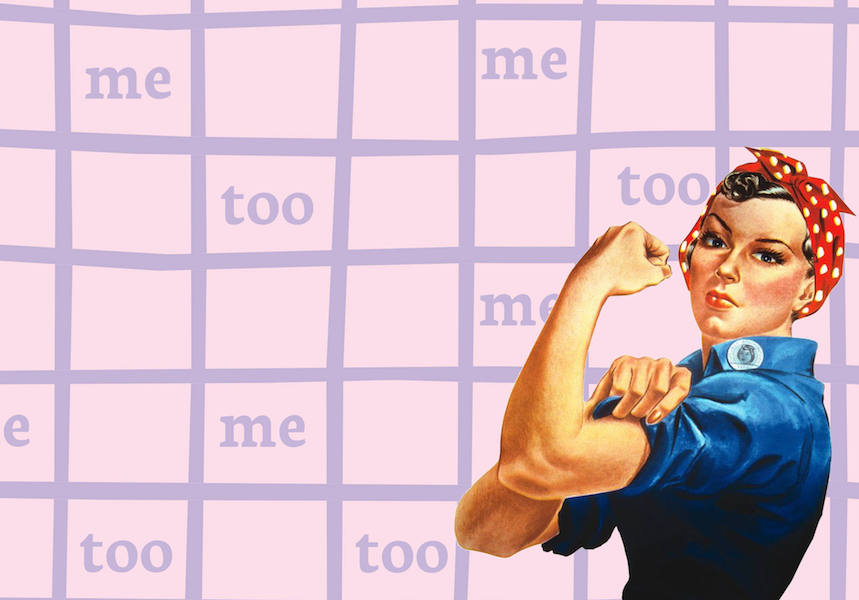The Harvey Weinstein scandal prompts widespread takedown of powerful men.
In 2017, we witnessed an unprecedented domino effect. Something finally gave and hundreds of women came forward with allegations and testimonies of sexual abuse, harassment and rape, dethroning and disgracing powerful men across show-business and politics. Finally, women are being believed.
The takedown of mega-producer Harvey Weinstein not only issued a mobilization to challenge extreme masculinity, abuse of power and disrespect of women and their bodies, but it gave women the precedent to speak out against the men that disrespected them. The patriarchy is taking a rapid tumble. We could not have imagined this kind of unity and transparency during the time of CBC radio broadcaster Jian Ghomeshi’s sexual assault trial in 2016. Many see Ghomeshi’s and Bill Cosby’s scandals as the beginning of what was to come. But it took some time.
Our societies and governments are still very much controlled by men. But 2017 showed that that can change. In October, feminist activist Gloria Steinem suggested on MSNBC that where we are right now with the Weinstein domino effect was a long time coming.
“If you steal money, you probably get arrested and convicted, because everybody says stealing is wrong. But if you do something that is very sexist or racist because there still is a critical mass of bias in this country, it takes more cumulative instances for it to be recognized,” said Steinem.
January’s hints of change
The construction of a new-wave women’s movement may have begun with the Women’s March the day after President Donald Trump’s inauguration—a worldwide protest advocating legislation and policies on women’s rights, among other things. What was thought of primarily as a Trump protest, in retrospect, symbolized so much more. This was the year of women, and those millions of pink knit beanies (pussy hats) in January declared the beginning of a year of feminist dialogue and empowerment.
Perhaps this widespread outrage at having a man accused by multiple women of sexual misconduct elected as president led to the Weinstein effect. By the end of October, over 80 women had accused disgraced film mogul Harvey Weinstein of sexual abuse, harassment and even rape. Other disgraced men in power included veteran journalist Charlie Rose, Democratic senator Al Franken and long-time NBC The Today Show host Matt Lauer. But victims are not limited to just women. Rent star Anthony Rapp accused actor Kevin Spacey of making a sexual advance towards him when he was only 14. The fallout resulted in Spacey’s subsequent firing from Netflix hit House of Cards and the shelving of his new film Gore. No one is safe, and the panic if felt across the continent’s entire patriarchal system.
Meanwhile, director Woody Allen—himself having been accused of molestation for years—made the mistake of commenting on the Weinstein scandal, expressing sympathy for the producer and concern about the creation of “a witch hunt atmosphere.” Journalist Lindy West’s response to this in The New York Times? “Sure, if you insist, it’s a witch hunt. I’m a witch, and I’m hunting you.”
Allen’s estranged son, investigative journalist Ronan Farrow, helped to break the Weinstein scandal, an experience that is no doubt satisfying given his outrage at the way the film industry continues to accept Allen despite sister Dylan Farrow’s molestation allegations. Ronan Farrow acknowledges that he experienced a great deal of change in the way victims interacted with press while he was seeking out information on Weinstein’s conduct: “It’s likely that the women who spoke to me have recently felt increasingly emboldened to talk about their experiences because of the way the world has changed regarding issues of sex and power,” said Farrow in his initial Weinstein article for The New Yorker.”
It is clear that there has been a significant shift in the media dynamic.
The #MeToo movement
In many ways, 2017 was also the year where women reclaimed the web. The #MeToo movement took off virally on social media in October this year. While the hashtag has been around for quite a while, it was finally popularized by actress Alyssa Milano following the Weinstein scandal break, after she encouraged the online widespread community to publicize personal experiences of misogynistic behaviour.
Since October, #MeToo has been used by over 500,000 people. That number will keep growing.
If you’ve been sexually harassed or assaulted write ‘me too’ as a reply to this tweet. pic.twitter.com/k2oeCiUf9n
— Alyssa Milano (@Alyssa_Milano) October 15, 2017
The #MeToo movement will continue into 2018, most notably at the Golden Globes in January where actors have pledged to wear black to protest gender inequality in the film industry.
Many notable male stars will wear black as well to stand in solidarity with women. Hopefully, 2018 will show a significant wave of male support as women continue to make headway with equality rights and treatment.
Who is missing out?
We have finally seemed to reach a tipping point. But some are missing out on the revolution. The women gaining traction in the media against their attackers are largely famous and white. Actress and activist Jane Fonda argued on MSNBC with Steinem that women of colour have been making accusations similar to that of the ones currently surrounding Weinstein—of sexual harassment and assault—for years. But the media and the general public have not paid as much attention: “This has been going on a long time to black women and other women of colour, and it doesn’t get out quite the same.”
Actress Lupita Nyong’o was the first black woman to come forward in the Weinstein case, and many journalists have begun reporting that men and women of colour have been largely absent from the culture shift. There is a concern that people of colour are at risk of missing the moment, as they are less likely to speak up about sexual harassment.
The next tipping point
Black activist Tarana Burke, who founded the Twitter #MeToo movement in 2006 in order to push a dialogue on sexual violence, said that the “stakes are higher in a lot of instances for us than they are for a lot of other women.” Women of colour have to think differently about what coming forward with sexual allegations could mean. Black activists argue that minority women’s bodies have traditionally been overly-sexualized and degraded. For these women, coming forward with sexual abuse claims has different cultural implications.
Perhaps we are moving towards another tipping point where women of colour will be leading the call for change. The media’s shift to finally believe women and their allegations will hopefully encourage women of colour to speak out and change the way society reacts to them as victims.
The call is out for men and enablers to step to the forefront of the #MeToo and feminist movements and change the way they choose to believe and support women.
What happens in 2018 won’t necessarily depend solely on the continued transparency and vocalization of women, but rather on the way all genders and races choose to unify.









